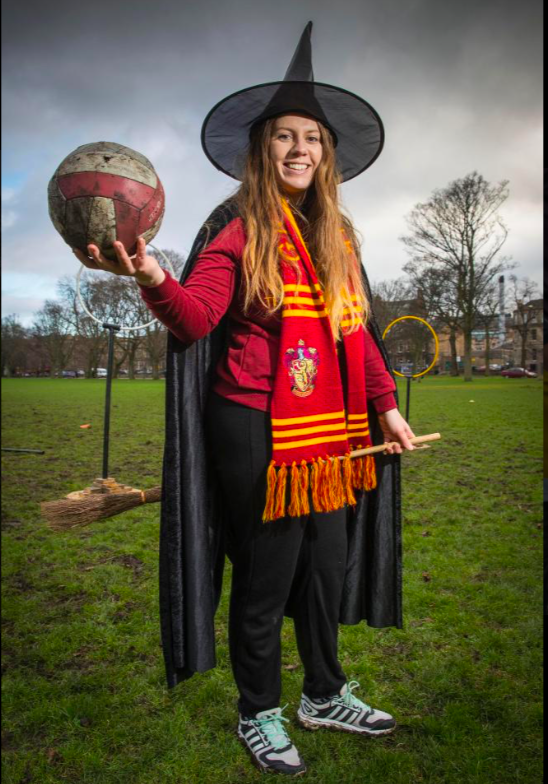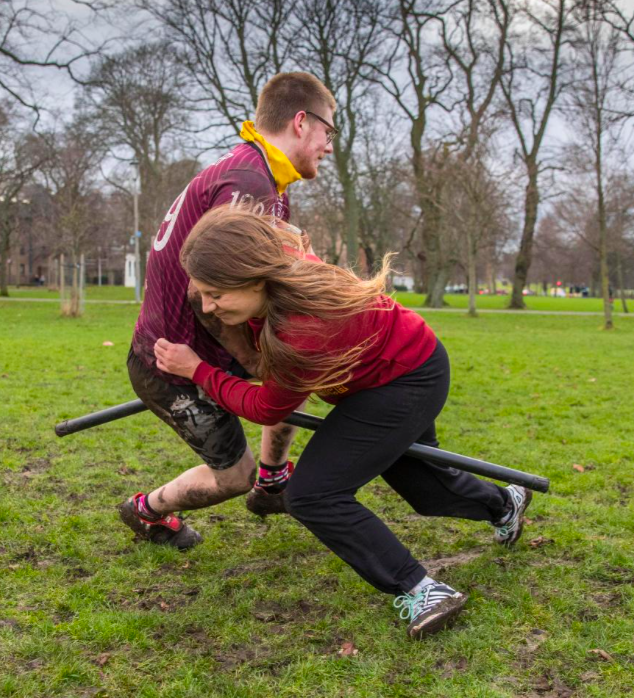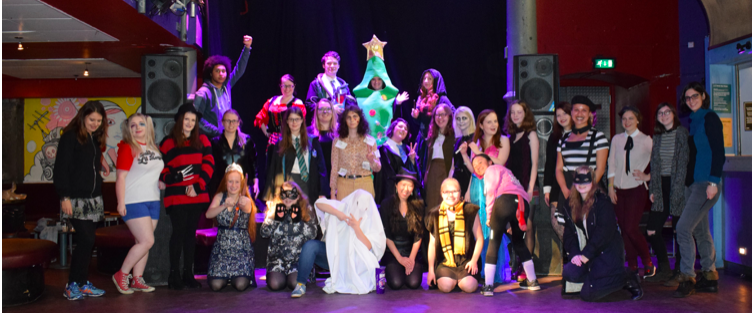Magic on the Meadows: why Quidditch is perfect for the 21st century.
From writing her first words of the series in a cafe on George IV Bridge to hosting the Quidditch Highlander Cup, J.K Rowling's Harry Potter books have deep routes in Scotland, and in Edinburgh specifically. Her imagination has inspired a city-wide passion for all things magic.
It was on my way into Uni that I first discovered the Holyrood Hippogryphs, Edinburgh's only student-Quidditch team.
Walking to lectures on a Wednesday afternoon in February is usually quite an introspective time of day, but on this occasion I was drawn to the rather hectic looking scene playing out in front of me on the meadows.
Six hoops at either end of the field, between which 20 or so people where running around with poles between their legs and tackling each other to the ground.
It took me a second to realise what it was that they were doing.
I, like most people my age, am more than familiar with Harry Potter and J.K Rowling's fantasy sport creation, Quidditch.

So intrigued was I that morning - to see Quidditch taking place outside of my own imagination or on television - that I decided to sit down and chat with captain and head coach of the Hippogryphs, Keiran, to find out more.
We sat in the corner, enclosed by gothic stone, hugging the fire place. A scene not unlike Rowling's descriptions of cagey meetings inside the Leakey Cauldorn or of hushed tones in the Griffindor common room.
However, our subject matter did not match up to the scheming plots or murderous machinations of the magic world. Just muggle answers to muggle questions. Nevertheless; interesting to us.
I quizzed Keiran for about an hour and decided to watch them train. It quickly became obvious to me that Quidditch was far more than what it seemed. It was perfect for the 21st century.
Unlike so many sports Quidditch has had a relatively short lifespan (Rowling's first novel, Harry Potter and the Philosopher's Stone, was first published in June, 1997).
Quidditch, in its formative years, has the opportunity to bypass many of the baleful traits that other sports have grown up with, such as gender or race inequality.

To the question, 'what do you like most about Quidditch?' - Keiran said:
"It’s more the inclusivity of the sport… like, it doesn’t matter who you are, what gender you are, what sexuality you are, race, anything… you can just come along, and we’ll accept you."
Up until now, Sport has been mainly segregated according to sex. Men play with and men and women play with women. Quidditch is breaking the mould in this. Perhaps the result of J.K Rowling's consistent mixing of the sexes throughout in her novels.
Quidditch is adaptable, it isn't institutional in the same way that other sports are. It is less rigid with a focus on experience rather than regulation.
"I liked how it was more casual than rugby and stuff. It offered me the opportunity to have a bit of fun without it being too serious." says Kieran.
"It still has the competitiveness…and as head coach I still I have to provide that level of intensity, but even then its more chilled."
This being said, Quidditch on Edinburgh's Meadows is still recognisably a sport. It is competitive, tough, fast-paced and complex enough to be intriguing. It keeps much of the camaraderie that consolidates the popularity of other sports.
It even hosts its own tournament, the Highlander cup. Teams from all over the north of England and Scotland compete during the summer.
"We are all really good friends. We go for pints once a week. We have socials. There's the Harry Potter society that a few of us members of" - a society that publishes written reports on inequality.
One member of the Hippogryphs said she had read the Harry Potter books front-to-back nearly 35 times.

Although Kieran admits that it is good to be different and publicity is generally helpful, he mentioned that there have been times when the Hippogryphs have been subjected to certain types of abuse from onlookers - the exact kind of xenophobia that the society aims to stamp out.
Chanting and heckling are the main issues as well as receiving some unwanted media attention.
"I mean, I understand that it’s a unique thing. People are gunna stop and think ‘what are they doing?’, which is fine. Curiosity is always there, but I’d prefer to be asked [for photos]. We’re a normal bunch of people; we’re not gunna bite your head off for asking a simple question.
I asked Kieran how and if he thought this could change. He said,
"Yes, I think it will, but it’s something that, unless we became an official sport [of the university], might happen very slowly."
So should the University of Edinburgh give Quidditch the same or similar opportunities as other sports? Should it offer funding, better facilities and protection to the Hippogryphs?
I would argue that their case ought to be heard.
By breaking down barriers and gaining more attention and popularity (it is in its 6th year now) the university should perhaps recognise Quidditch and usher in a sport that is perfect for the 21st century.
By Marcus McGrigor

0 Comments Add a Comment?